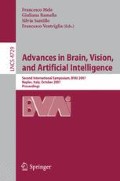Abstract
One of the primary aims in human-computer interaction research is to develop an ability to recognize affective state of the user. Such ability is indispensable to have a more human-like nature in human-computer interaction. However, the researches in this direction are not mature and intensive efforts have only been witnessed recently. This work envisages the possibility of enhancing feature selection phase of emotion detection task to obtain robust parameters which will be determined from verbal information to achieve an improved affective human-computer interaction. As highly informative feature selection is believed to be a more critical factor than classifier itself, recent studies have increasingly focussed on determining features that contribute more to the classification problem. Two new frameworks for multi-class emotion detection problem are proposed in this paper, so as to boost the feature selection algorithms in a way that the selected features will be more informative in terms of class-separability. Evaluation of the selected final features is accomplished by multi-class classifiers. Results show that the proposed frameworks are successful in terms of attaining lower average cross-validation error.
Access this chapter
Tax calculation will be finalised at checkout
Purchases are for personal use only
Preview
Unable to display preview. Download preview PDF.
References
Hewett, C.: Curricula for Human Computer Interaction. ACM SIGCHI 1514 Broadway 10036, 15 (2002)
Vonada, N.A.: Introduction of Human Computer Interaction in Modern Education. In: Proc. of ISECON 2004. 21st Annual Information Systems Education Conference (2004), accessed via http://isedj.org/isecon/2004/3442/ISECON.2004.Vonada.pdf
Pantic, M., Rothkrantz, L.J.M.: Expert system for automatic analysis of facial expressions. Image and Vision Computing 8, 881–905 (2000)
Pantic, M., Rothkrantz, L.J.M.: Toward an affect-sensitive multimodal human-computer interaction. Proceedings of the IEEE 91(9), 1370–1390 (2003)
Altun, H.: Human computer interaction and its impact on e-learning in engineering education. In: The Proceeding of 1 Int. Conference on Innovations in Learning for the Future: e- learning, Istanbul, pp. 433–440 (2004)
Fasel, I., Stewart-Bartlett, M., Littelwort-Ford, G., Movellan, J.R.: Real time fully automatic coding of facial expressions from video. In: Proceedings of the 9th Symposium on Neural Computation, California Institute of Technology (May 2002)
Juslin, P.N., Scherer, K.R.: Vocal expression of affect. In: Harrigan, J., Rosenthal, R., Scherer, K. (eds.) The New Handbook of Methods in Nonverbal Behavior Research, Oxford University Press, Oxford, UK (2005)
Cowie, R., Douglas-Cowie, E., Tsapatsoulis, N., Votsis, G., Kollias, S., Fellenz, W., Taylor, J.G.: Emotion Recognition in Human-Computer Interaction. IEEE Signal Processing Magazine 18(1), 32–80 (2001)
Gilad-Bachrach, R., Navot, A., Tishby, N.: Margin Based Feature Selection: Theory and Algorithms. In: ICML. Proceeding of the 21’st International Confereence on Machine Learning, pp. 337–344 (2004)
Liu, H., Yu, L.: Toward Integrating Feature Selection Algorithms for Classification and Clustering. IEEE, Trans. on Knowledge and Data Engineering 17(4), 491–502 (2005)
Zhou, X., Mao, K.Z.: LS Bound based gene selection for DNA microarray data. Bioinformatics 21(8), 1559–1564 (2005)
Weston, J., Mukherjee, S., Chapelle, O., Pontil, M., Poggio, T., Vapnik, V.: Feature Selection for SVMs. In: Advances in Neural Information Processing Systems 13. Neural Information Processing Systems (NIPS), pp. 668–674 (2000)
Zaffalon, M., Hutter, M.: Robust feature selection by mutual information distributions. In: Darwiche, A., Friedman, N. (eds.) UAI 2002. Proceedings of the 18th Conference on Uncertainty in Artificial Intelligence, pp. 577–584. Morgan Kaufmann, San Francisco (2002)
Reynolds, C., Ishikawa, M., Tsujino, H.: Realizing Affect in Speech Classification in Real-Time. Aurally Informed Performance: Integrating Machine Listening and Auditory Presentation in Robotic Systems. In: conjunction with AAAI Fall Symposia, October 13-15, 2006, Washington, DC, USA (2006)
Pantic, M., Sebe, N., Cohn, J.F., Huang, T.: Affective Multimodal Human-Computer Interaction. In: Proc. of ACM Int. Conf. on Multimedia, pp. 669–676. ACM Press, New York (2005)
Wang, Y., Guan, L.: An investigation of speech based human emotion recognition. In: IEEE 6th Workshop on Multimedia Signal Processing, pp. 15–18 (2004)
Ververidis, D., Kotropoulos, D.: Emotional speech classification using Gaussian mixture models and the sequential floating forward selection algorithm. In: ICME 2005. IEEE International Conference on Multimedia and Expo, pp. 1500–1503 (2005)
Ververidis, D., Kotropoulos, Y.: Automatic speech classification to five emotional states based on gender information. In: Proc. 12th European Signal Processing Conf., pp. 341–344 (2004)
Fragopanagos, N., Taylor, J.G.: Emotion recognition in human–computer interaction. Neural Networks 18, 389–405 (2005)
Fernandez, R., Picard, R.W.: Classical and Novel Discriminant Features for Affect Recognition from Speech. In: Interspeech 2005. Eurospeech 9th European Conference on Speech Communication and Technology (2005)
Schuller, B., Arsic, D., Wallhoff, F., Rigoll, G.: Emotion Recognition in the Noise Applying Large Acoustic Feature Sets. Speech Prosody, Dresden (2006)
Burkhardt, F., Paeschke, A., Rolfes, M.: Walter Sendlmeier und Benjamin Weiss, A Database of German Emotional Speech. In: Proceedings Interspeech (2005)
Dogan, G.: Emotion Detection Using Neural Networks. MSc Thesis, Nigde University (2006)
Xiao, Z., Dellandrea, E., Dou, W., Chen, L.: Features extraction and selection for emotional speech classification. In: Proceedings of IEEE Conference on Advanced Video and Signal Based Surveillance, pp. 411–416 (2005)
Author information
Authors and Affiliations
Editor information
Rights and permissions
Copyright information
© 2007 Springer-Verlag Berlin Heidelberg
About this paper
Cite this paper
Altun, H., Polat, G. (2007). New Frameworks to Boost Feature Selection Algorithms in Emotion Detection for Improved Human-Computer Interaction. In: Mele, F., Ramella, G., Santillo, S., Ventriglia, F. (eds) Advances in Brain, Vision, and Artificial Intelligence. BVAI 2007. Lecture Notes in Computer Science, vol 4729. Springer, Berlin, Heidelberg. https://doi.org/10.1007/978-3-540-75555-5_51
Download citation
DOI: https://doi.org/10.1007/978-3-540-75555-5_51
Publisher Name: Springer, Berlin, Heidelberg
Print ISBN: 978-3-540-75554-8
Online ISBN: 978-3-540-75555-5
eBook Packages: Computer ScienceComputer Science (R0)

